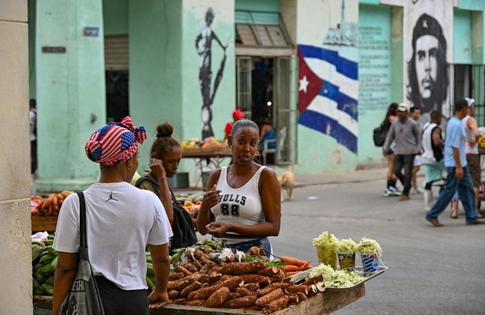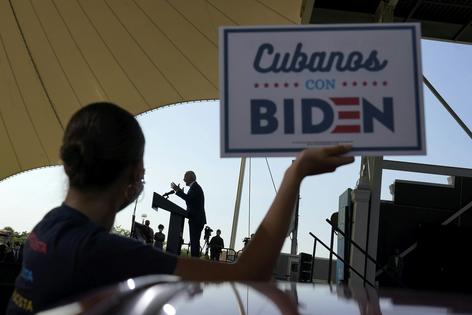Biden’s move to remove Cuba from terror list continues ‘yo-yo’ policy likely to be reversed by Trump
Published in Political News
The Biden administration has signaled to Congress its intention to remove Cuba’s designation as a state sponsor of terrorism.
But here’s the twist: The move will only become legal upon the publication of a Federal Register notice – and that will likely happen under President Joe Biden’s successor, Donald Trump, who looks set to push a much more hawkish approach toward the Caribbean island.
This would mirror what Trump did to Biden at the tail end of the Republican’s first presidency by putting Cuba back on the terror list when a Federal Register notice was published on Jan. 22, 2021 – after Biden’s inauguration.
The ball is now in Trump’s court again. Given his comments and past stances – and notably that of Marco Rubio, a Cuban American politician who is Trump’s pick for secretary of state and has a long-standing record of animosity toward the island’s Communist government – it could well be the case that the yo-yoing of U.S. policy on Cuba continues.
But not necessarily so: The incoming administration has other sanction options at its disposal that could serve to pressure Havana without isolating the nation from the international community.
The Biden administration’s move to delist Cuba should come as no surprise.
The terrorism designation change was presaged by the decision in early 2024 to remove Cuba from the “not fully cooperating” with anti-terrorism efforts list due to Havana’s counterterrorism efforts.
Throughout the Biden administration, Cuba has worked with U.S. law enforcement – primarily through its engagement with the FBI as well as through the multilateral body Financial Action Task Force – to combat illicit financing, including the funding of terrorism.
But despite these efforts, it was always unlikely that the Biden administration would remove Cuba from the terrorism list before the presidential election in November 2024, especially given the Democrats’ need to look tough on security issues – a key issue in Trump’s campaign.
That, coupled with Florida’s politics – Cuban Americans are an important electoral force in the state and tend to strongly support Cuba’s inclusion on the terrorism list – made a change in the nation’s designation an electoral grenade.
Biden’s move now is less challenging because the next major federal election is two years away, when the midterm House and Senate races could decide control of the legislative bodies where margins are currently slim.
As such, I believe that removing Cuba from the state sponsors of terrorism list is unlikely to hinder the campaigns of Democrats running in congressional races in late 2026.
Biden’s move is not only politically insulated, but it is arguably legally valid. Cuba meets the legal criteria to be delisted – just as it did when the Obama administration removed Cuba from the list in 2015.
To be eligible for delisting, the State Department’s Counterterrorism Bureau, where I once worked and directed its terrorist designation efforts, would have to illustrate that Cuba has not engaged in providing support for acts of terrorism over the previous six months; and that the nation’s government has provided assurances that it will no longer engage in acts supporting terrorism.
The Biden administration has evidently made a decision, as Obama did previously, that Cuba is no longer supporting leftist communist groups that the U.S. has designated as terrorist.
Cuba has a checkered history of supporting such groups. It was put on the U.S. list in the early 1980s due to its actions supporting groups including Colombia’s FARC and ELN. While the latter is enmeshed in long-term, sometimes rocky peace talks with the Colombian government, the former has dissolved and was removed from the State Department’s Foreign Terrorist Organization list in 2021.
I doubt that Cuba’s yo-yoing on and off the terrorist list is over.
For Trump to add Cuba back on, he will need Rubio’s State Department to prove that Cuba has “provided repeated support for acts of international terrorism.”
Considering that the same set of civil servants with legal expertise just determined that Cuba no longer warranted the listing, this will, at a minimum, require some creative legal interpretation by the lawyers at the State Department and White House.
It is, I believe, likely that political pressure will be applied on these lawyers to make a very different decision – one that will certainly be called into question for its legal validity.
Trump could also threaten a new state sponsor of terrorism listing to gain concessions from Cuba on a broad range of unresolved bilateral issues between the United States and Cuba. For example, the case of Joanne Chesimard, also known as Assata Shakur – a Black Liberation Army activist who killed a New Jersey state trooper and fled to Cuba in 1984 after escaping prison. Her case, given the efforts by the U.S. government to have Chesimard extradited to the U.S., has remained an area of contention between Cuba and the U.S.
And while Chesimard’s case is not an example of Cuban-sponsored terrorism, State Department decisions on new listings and delistings have in the past been linked to nonterrorism issues. For instance, North Korea was removed by the George W. Bush administration because of Pyongyang’s promise to halt its nuclear program and allow inspectors access to its Yongbyon nuclear reactor.
While the Biden administration’s delisting of Cuba may temporarily pivot U.S.-Cuba relations toward warmer ground, there are moves, including the possible relisting of Cuba, that Secretary of State-designate Rubio may be able to make that will reverse this trajectory.
But rather than a knee-jerk relisting of Cuba based on flimsy or nonexistent evidence of Cuba’s support of terrorism, the Trump administration may be wise to focus on the Cuban government’s actual weaknesses – an atrocious human rights record, corruption, kleptocracy and a failed communist ideology that has left the island impoverished.
Here, there are a bevy of sanctioning tools unrelated to terrorism that the Trump administration can deploy and that can laser-focus on the Cuban politicians responsible for those policies, rather than the island’s people as a whole.
Such targeted measures would diminish the impact of U.S. sanctions on a Cuban population already suffering as a result of its government’s human rights and economic record.
As such, the Biden administration’s decision to remove Cuba from the terrorist list gives a glimmer of hope to Cubans who need support from the outside. For example, it makes it easier for U.S. banks to engage in a wider variety of transactions that put bread on the table of Cubans. It may also increase tourism-related travel to Cuba.
Ultimately, in my view, any attempt by Trump to reverse Biden’s decision is unlikely to create the regime change it wants. It will instead only prolong the suffering of Cubans as a whole.
This article is republished from The Conversation, a nonprofit, independent news organization bringing you facts and trustworthy analysis to help you make sense of our complex world. It was written by: Jason M. Blazakis, Middlebury
Read more:
Marco Rubio is no friend of Havana − but does Trump’s pick for secretary of state mean Cuba policy is set?
How the CIA director helps the US navigate a world of spies, threats and geopolitical turbulence
Will the lights go out on Cuba’s communist leaders? With fewer options to prop up economy, their future looks dimmer
Jason M. Blazakis does not work for, consult, own shares in or receive funding from any company or organization that would benefit from this article, and has disclosed no relevant affiliations beyond their academic appointment.
































































Comments